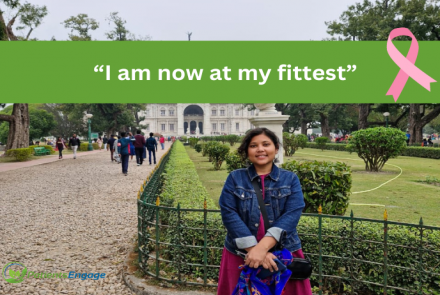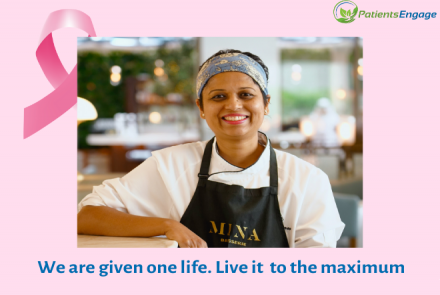
Jayshree Guru was diagnosed with breast cancer, but she decided to be strong to face the treatment, for her own sake as well as for her family. Having dealt with cancer, she was not prepared when Lymphoedema set in. With help and assistance from Lakshmi Pain and Palliative Care, Jayshree learnt to treat lymphoedema.
I was diagnosed with breast cancer at 48yrs. It was tough, and I did not think much about it at that time. One thing I decided - that I will not become weak and feel helpless and have a sorry mind set. I had my husband who was my strength. I decided to be strong and face the treatment being strong. It gave me and my loved ones the strength to face the cancer treatment differently.
Symptoms of Lymphoedema and its Impact
The Breast Cancer treatment was over and mentally I had written off the word Cancer from my life. Little did I know that there are other side effects of treatment which can become a part of life.
My hand was a swollen hand and the swelling extended to my fingers. It’s very hard and difficult to accept when one is told we have to live with it. The whole world changes. Our priorities also change, as a result.
Many think there is no solution and ignore their swollen arm, which complicates the solution to the problem. They refuse to go out and be part of any group or crowd. Self-esteem drops and all one thinks is the pressure and pain of the swollen arm, with a heavy heart and mind which just revolve around the Lymphoedema.
No doubt the word cancer scares everyone, including their families. To add to it there is now lymphoedema to deal with. Many survivors simply accept lymphoedema as fate and destiny and try to go on with their lives without asking questions till it starts giving problems. This is due to lack of awareness.
How To Deal With Lymphoedema
First and foremost, lymphoedema can be controlled and should be controlled. Enough research has been done to prove how early detection helps control the oedema. In my view, one should do all the exercises taught after mastectomy in the hospital for prevention of lymphoedema. They are taught in hospitals but the pros and cons of those exercises are never explained/ emphasised well. Doing exercises should become part of our life like brushing our teeth.
Initially, I was very upset and angry. We feel we have been let down by the doctor who treats us. Being upset is a natural feeling. But being angry is totally a waste of energy. We trust the doctor for our treatment and in my experience 99% of the doctors have only one thought and prayer that we should be treated well and also live well. That trust should not evaporate because of lymphoedema. There are no sure shotway of knowing or measuring if lymphoedema is going to set in for a person. It’s not fair to expect this prediction from the doctor who does the surgery and removes nodes to eliminate the cancer cells. The oncologist’s first and foremost thought is to save our body from any cancer cells left behind.
HOW TO TAKE CARE
Balancing the Arms
Take the oncologist’s help to find a good physiotherapist and slowly build your muscle strength of both your arms. The affected arm should be used to do the supporting role in our chores and the other arm has to take the extra load of the affected arm. Learn Manual Lymphatic drainage massage. Research says that this helps our body to find ways to drain the collected lymphatic fluid. The second point of advice is to go for regular exercises. It’s helpful to learn from a physiotherapist the right way to do and learn more exercises to keep the oedema arm free.
Using the Pneumatic Pressure Machines
Even for those whose arm is swollen and the skin has become hard, it’s not too late. Start with skin care of the affected arm, manual lymphatic drainage and exercises. There are machines – Pneumatic pressure machines - which used under guidance helps in reducing the swelling. Don’t assume the higher the pressure and time the faster our swelling reduces. First apply a moisturiser and use the machine. Continue your exercises even when you use these machines.
Compression Garments
Compression garments are a must. If the swelling is more, then the need to keep the pressure of compression garment is a must. Initially one might have to resize their compression garment often to maintain the pressure. Generally the compression garment supplier does this once or twice. No need to buy a new one every time.
Positive attitude
Last but not the least, your emotions and thought processes. It’s natural to worry and our moods also go awry. But, these things will not help nor cure you in managing your oedema. Have a positive attitude and mental strength that THIS CAN BE MANAGED.
Small adjustments to make life simpler
We can live a normal life with a few adjustments. Don’t push yourself too much. Listen to your arm pain and stop and rest for 10 to 15 mins when you feel pain during working. Learn to ask for help it the job requires more pressure from your arm, like cutting a carrot or any hard veg. Take breaks when working for long hours. Keep your arm raised when not working. Apply anti-septic cream if you get even a small cut on the affected limb. Be aware that walking for long hours with your arm down will increase the swelling, but can be drained out in next few days. It helps us and our loved ones to live happily if we manage our swollen arm. It’s our responsibility to do our exercises and keep the swelling under our control.
I could do it. So can you.
When I was struggling with this problem a few years ago, I met the health care team at Lakshmi Pain and Palliative Care Centre. They understod the distress caused by lymphoedema and were very supportive and gave me the strength to move on. They are reaching out to many people in need with their team of trained nurses and physiotherapists.
Tips To Control Lymphoedema
Lymphedoema, if taken care, can be controlled and one can still lead a normal life. Daily exercises and massaging, and extreme care in not getting an open cut or if you get one taking immediate care, will keep one worry free.
Few points which can help :
- Don’t be angry or bitter that you’re having to deal with lymphoedema.
- Do your exercises regularly.
- Don’t let the affected arm be used for blood test and even to check BP.
- Keep an anti-septic cream in your hand bag.
- Even a small cut needs attention.
- Keep your hand moisturised.
- Keep your hand raised.
- Dont carry more than 5 kg.
- Wear the compression garment regularly
- Use the pneumatic compression machine if needed.
AND DON'T FORGET
Don’t let the swelling set in as the skin may become hard. Learn to take breaks and rest your arm whenever you are doing a task. Don’t use force on the affected arm while doing tasks. Keep a positive mind and don’t get scared or worried.
Exercises and manual lymphatic drainage are the way to normal life.
The responsibility is yours.
















